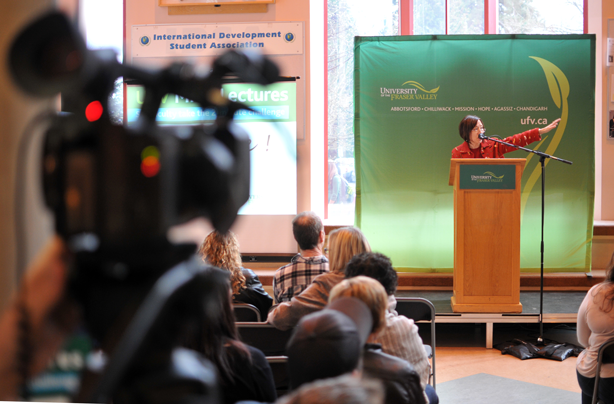By Christopher DeMarcus (The Cascade) – Email
Print Edition: November 20, 2013

What could you do in two minutes? You could relax, or you could try to explain years’ worth of research to a crowd of students and faculty. Which is just what UFV faculty members were doing on November 13 at the Roadrunner Café on the Abbotsford campus.
With only one Powerpoint slide, professors were required to give their micro-lectures while a traffic light timer app counted down the seconds. The point is to build bridges between disciplines and whet intellectual appetites. Thirteen professors presented their research findings starting with Darrell Fox, an instructor of social work and human services.
“Childcare based on traditional M?ori techniques in New Zealand enhances children advocacy. My quantitative research project looked at internal advocates to support children,” he explained. “In New Zealand and Canada, it would be used in aboriginal communities and therefore there are some concerns.”
Darrell was quickly cut off by the red light. His time was up. Laughter erupted from the crowd. The proceeding lectures stuck to the hard-and-fast rules.
Mathematics instructor Judy Larson talked about the growing popularity of the flipped classroom. The idea is that students watch lectures on their computers at home, then use the classroom for one-on-one or group learning.
“My desire is to free class time for inquiry based, student-centred learning, which is often very difficult in a limited time-frame,” she said, “The flipped classroom model allows teachers to capitalize on advancements of technology.”
Communications instructor Linda Pardy’s research looked at students that are “at-risk” or “non-traditional,” and what enabled them to succeed. She followed the path of 2010 graduates to see if they had found full-time employment.
“I’m happy to report that they are flourishing. They are employed and they are able to support themselves; prior to their degree they were not,” she said.
But Pardy found more than employment stats in her research. She found that all students need trust to succeed at university.
“Students go to the crowd or the cloud,” she explained, “We do not have ‘traditional’ students. . . students are really slow to trust. We need authentic, real, and ongoing support that help people to learn trust.”
The next topic was a hybrid of history, communications, and English studies, focusing on the communication of Indian soldiers in WWI.
“Many were sent to fight in France, their letters were censored because there was some seditious activities that were going on in Europe that were anti-imperialist,” English instructor Prabhjot Parmar said. Parmar has read thousands of censored letters and documents from the time period in which soldiers wrote about despondency and discouragements – not to enlist because the war was so terrible. Parmar has captured some of those voices in her book, When Your Voice Tastes Like Home: Immigrant Women Write.
Last to speak on his work with philosophical counselling was philosophy instructor Peter Raabe.
“Philosophy can prevent and cure mental illnesses,” he said, trying to give a quick rundown of his concepts of internal mental illness, and how philosophy can be used as treatment in psychotherapy.
“The conventional approach is the biological; people are seen as biological machines. The physician sees the brain as a physical entity needing brain repairs.
“On the other hand, the intentional stance sees humans as people who think about things, experience feelings, and perceive meaning – the person struggling with meaningful life circumstances. In other words, mental and emotional suffering is not seen by a malfunctioning brain. It is seen as occurring for human reasons,” said Raabe. “Mental illness is intentional.”
“Shock and disbelief,” was how Dr. Peter Raabe described the healthcare profession’s response to the ideas in his upcoming book Philosophy’s Role in Counseling and Psychotherapy. At the same time, it was clear that the audience needed more than two minutes to unpack the issue.
Having to cram so much information into such little time might seem counter-productive, but that afternoon, classes were buzzing with conversations about the lecture series. More than anything, it let students hear ideas from outside their departments while showcasing the great research that goes on at UFV.

